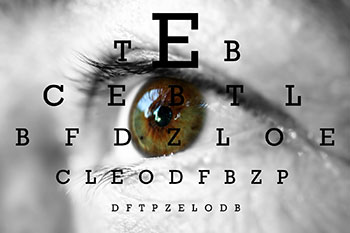Macular Degeneration
Macular Degeneration is an age related chronic eye disease, typically affecting people who are 65 years or older. Research also suggests there is a genetic component to the disease. The macula is the small central area in the retina that is responsible for the sharp central vision needed to read, drive or see fine details. Although macular degeneration is almost never a totally blinding condition, it can be a source of significant visual disability. It can affect both eyes or just one eye.
Dry Macular Degeneration
Macular Degeneration occurs when the macula deteriorates. It can occur in two forms – Dry or Wet. Dry Macular Degeneration is the more common form of the disease and may cause dimming or distortion in the middle of your vision. This is most noticeable when trying to read. In more advanced stages, it can cause blurry central vision or a central blind spot.
video: Dry Macular Degeneration
Dry Macular Degeneration is normally monitored with routine dilated exams. You may be asked to monitor an Amsler Grid at home once a week to check for any changes. The amsler grid is a graph made up of dark, straight lines that create a square. To use the grid, you will check one eye at a time while wearing your usual glasses. If any distortion, waviness, broken lines or missing areas are noticed, you should notify your eye doctor promptly. There is no current treatment for Dry Macular Degeneration. But this doesn’t mean you’ll eventually lose all of your sight. Dry Macular Degeneration usually progresses slowly, and many people with this condition can live relatively normal, productive lives, especially if only one eye is affected. Your doctor may recommend taking an eye vitamin to help decrease the risk of developing the more severe type of Macular Degeneration.
Wet Macular Degeneration
In about 10% of cases, Dry Macular Degeneration progresses to the more advanced form- Wet Macular Degeneration. With Wet Macular Degeneration, new abnormal blood vessels grow under the retina and macula. These new blood vessels then bleed and leak fluid. This causes the macula to bulge or lift up from its normally flat position and can lead to severe vision loss. The earlier that Wet Macular Degeneration is diagnosed and treated, the better chance you have of preserving some or much of your central vision.
Wet Macular Degeneration can’t be cured. If diagnosed early, treatment may help slow the progression and reduce the amount of vision lost . Medications may help stop growth of these new blood vessels by blocking VEGF (Vascular Endothelial Growth Factor) which is a protein found in the eye. These medications are injected directly into your eye. The eye is numbed prior to the injections so there is typically minimal discomfort. You may undergo repeated injections every four weeks to maintain the beneficial effect of the medication. In some instances, you may partially recover vision as the blood vessels shrink and the fluid under the retina absorbs.
Unfortunately, even after treatment, Wet Macular Degeneration can recur. Because of this, you should test your own vision regularly and follow the recommendations of your eye doctor. Proper and timely treatment can slow the rate of vision loss and may even improve vision.
video: Wet Macular Degeneration





